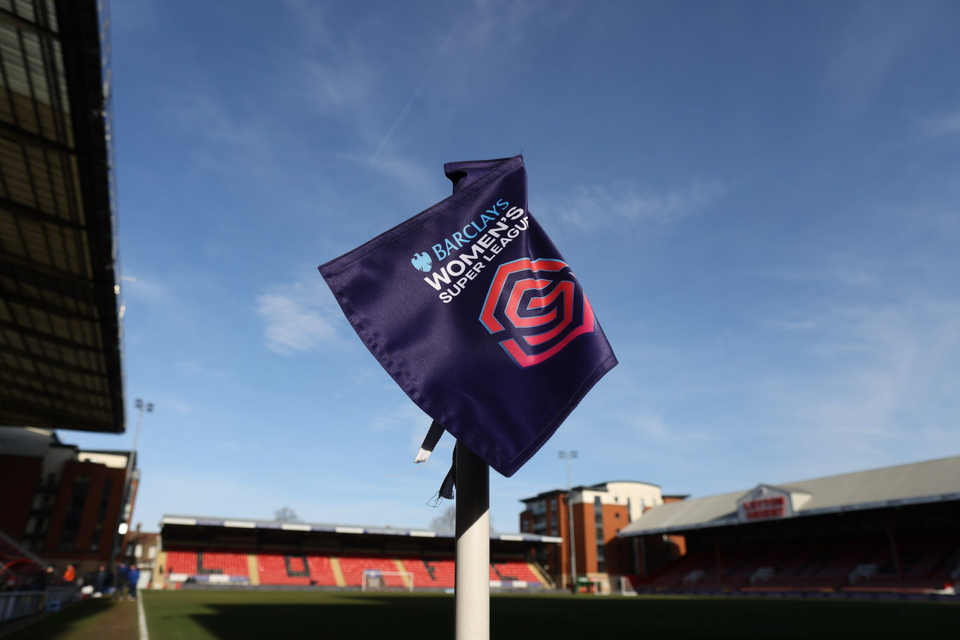April Bonus Issue — Daniel Levy's Not-So-Benevolent Sexism

I might have let the Julian Nagelsmann explainer post serve as the bonus issue for this month, but I couldn't let Daniel Levy's recent nonsense about the WSL stand, so a second bonus issue it is! Calling it nonsense is being too nice, honestly.
Get out of our club—or at least the Women's team
I'm actually not joking about this. After his recent comments about the WSL and women's football in general, I have zero faith that Daniel Levy can be a good steward of Spurs Women. Of course, we're stuck with him as the symbolic figurehead for the time being, but he should not be a significant decision-maker in the running of the Women's team.
Why? Well, let's start with the answer—or non-answer, as it was—to a question about Spurs Women during Levy's recent interview with Cambridge Union. He was asked, "For such a big club like Tottenham, what's the strategy for getting the Women's team to compete with the likes of Chelsea, Arsenal, Man City, and are there any parallels to earlier in your tenure with the Men's team?" A thoughtful question which deserved a much more thoughtful answer than what we got:
That's a very good question, women's vs men's football, very different. At the moment, I think people look at women's football and think it should be the same as men's football in terms of how it's run and all the rules. And actually, it needs to be something completely different because if you look at the economics of women's football at the moment, there is not the consumer interest compared to men's. Ticket pricing is exceedingly low. TV rights are very low. Sponsor interest is limited. And as a consequence, every single club in the Premier League's women's club is losing money. And then longterm, that's not sustainable. So, something is going to have to change, and that's why there's currently a number of reviews going on as to what those changes should be.
I figured a transcript would be more useful for this newsletter format, but if you'd like to watch the relevant bit and actually hear the disdain in his voice, it's queued up at this timestamp. Proceed at your own risk.
So yes, it was not an answer to the actual question. Does Levy have a strategy to make Spurs Women more competitive with our London rivals and the Manchester teams? We'll never know, but I suspect not. His primary concern, surprise surprise, seems to be with the economic outlook.
And I don't dispute any of the facts that he mentions, such as low ticket pricing, TV rights being undervalued (this was a major point of contention recently with the upcoming Women's World Cup; FIFA made a point of stating that the bids made were "unacceptable" relative to the value of the viewership figures.), or even the fact that teams are still losing money at this stage (it doesn't help that in England, women's football was banned for decades and that damage is just now beginning to be undone). The one claim I will argue with, however, is the idea that sponsorship interest is limited. Take a look at the recent campaign from Adidas showcasing the new World Cup kits to general acclaim, or observe how—here across the pond—the NWSL is in a period of rapid expansion thanks to new (and sometimes old) markets being identified in which to grow a culture of women's football.
It's just curious that a man who is renowned for his commercial strategy prowess has such a limited imagination when it comes to the potential of women's football. And by curious I mean infuriating; this attitude is going to make Spurs Women get left (even further) behind in the power rankings of the WSL.
Let's linger on that last sentence of Levy's answer. Gee, I wonder what changes he thinks should be considered to improve the landscape of women's football...
We didn't have to wait long to find out. Just a few days after this interview was released, there was a bombshell article in Versus revealing that Levy believes the WSL should scrap relegation and promotion and "adopt a single-table format similar to the National Women’s Soccer League in America." By eliminating the threat of relegation, Levy argued, clubs would feel more comfortable investing in their women's teams.
There is so much to unpack here, not least the implication that Levy doesn't currently feel comfortable investing in his own women's team. Strangely, this kind of flies in the face of reality, since Spurs broke the intra-WSL transfer fee record this past January by signing Beth England from Chelsea—a move that could very well be the only thing keeping Spurs Women safe from relegation (we are still not mathematically safe yet, unfortunately, but Beth's goals have won us vital points since she joined). It's such a weird self-own to downplay that kind of much-needed investment with these comments.
But outside of that marquee signing, the investment in the squad has been much more conservative. During the summer window, Spurs preferred to recruit mostly up-and-coming players, though we did pay a transfer fee for Celin Bizet to sign her from PSG. And then in January, the only other signing was a loan deal for Mana Iwabuchi. So there is definitely some hesitance from the Tottenham board to fully commit to rebuilding the squad into one that can compete with the best of the best in the WSL.
Getting back to the suggestion of making the WSL a closed league, like the NWSL, I think that Levy fundamentally misunderstands the differences between the two leagues that would make such a structure dangerous to English women's football. The NWSL has a lot of measures in place to ensure a relative level of parity between its teams—some of which I support and some of which I would like to see done away with, such as the draft system that takes players' careers out of their own hands. Without, for example, a salary cap, the WSL would continue to see clubs like Chelsea and Arsenal attract the best players because they can pay the highest transfer fees and highest wages. It would be very difficult for a club like Reading, for instance, to compete with that monetary advantage from the London clubs.
Keeping with that example, sure, Reading wouldn't have to worry about relegation anymore (as they are this season) in Levy's proposed future for the league, but neither would there be any motivation to increase investment when they can't actually bridge the gap with teams who have much wealthier parent clubs. In my eyes, this would be an open invitation for certain clubs who are already underinvesting in their women's teams to simply do the bare minimum of keeping them running. And frankly, if their attitude towards women's football is anything like Levy's, they don't need much of an invitation.
The other crucial difference between the NWSL and WSL is that the NWSL is in an expansion phase, and I don't see there being the same kind of appetite for that in the English system. Clubs like London City Lionesses that are independent of a parent club with a men's team are a rarity, and there's not a huge appetite from investors to launch brand new clubs in a country where most communities already have clubs with long and storied histories that new clubs would have to compete with. In America, teams have to deal with the challenge of starting new club brand identities from scratch; in England, that name recognition and club affinities are already there to be tapped into.
But the biggest issue with a closed top flight is that it would all but ensure lower-division women's football would stall out with no hope of growth. As it is, there has been a lot of increased investment in teams in the Championship and even as far down as the fourth division with Newcastle (obviously problematic because of the source of those funds, but noteworthy here nonetheless) because they have aspirations of eventually making it into the top flight and enjoying the expanded commercial and footballing opportunities afford by WSL status. Besides being discouraging to the many investors and savvy owners in the lower leagues (Lewes FC immediately comes to mind, but also the aforementioned London City Lionesses), it would be a slap in the face to the players on these teams who don't deserve to have the door slammed shut on their dreams.
'I cannot see the logic' - Lewes FC CEO @MaggieMrphy on why it would be devastating for English women's soccer if the WSL was to ditch relegation and promotion.#SPLive23 #SportsBiz #WSL pic.twitter.com/GTF9VEufPp
— SportsPro (@SportsPro) April 25, 2023
Levy's suggestion to make the WSL a closed system is anti-competitive and fails to recognize that there is a bright future for women's football, if only the right people are able to lead that charge. He's brought embarrassment to our football club in a week where we already felt ashamed of the way the club is being run, and now we have to add concern that Spurs Women are being undervalued and under-resourced on top of that. Hopefully, the recent appointment of Scott Munn is a sign that Levy is going to allow other people to prioritize the running of the Women's team, even if he does not care to do so with any real passion himself.

Thank you for reading!
If you’re enjoying the newsletter, make sure to sign up for a free subscription to receive new issues in your inbox, or upgrade to a paid membership to unlock additional bonus content every month. You can also buy me a Ko-fi for a one-time tip. Your support keeps Spurs Across the Pond running and is much appreciated.
You can also find me on Twitter and podcasting at N17 Women and The Tottenham Depot.

Member discussion